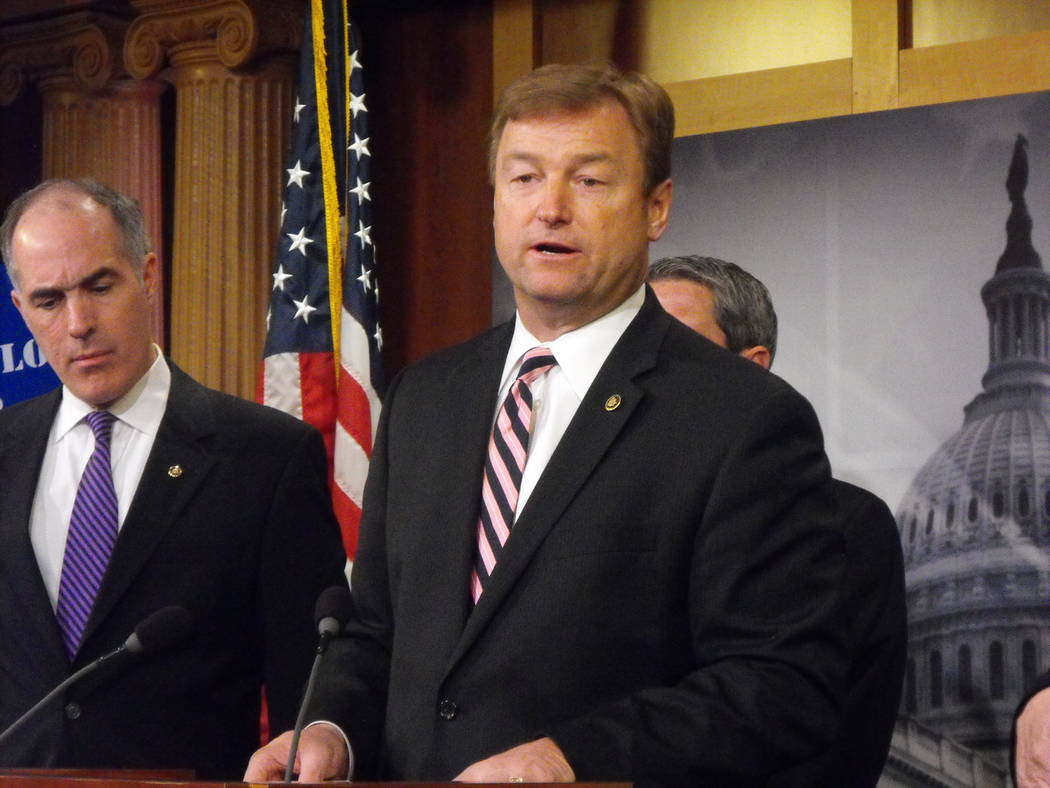Nevada’s Dean Heller speaks on net neutrality
U.S. Sen. Dean Heller, R-Nevada, made firm his opposition to net neutrality being preserved during a conference call with reporters from rural newspapers.
A measure to overturn the Federal Communications Commission’s decision to nix the rules at the end of 2017 passed the Senate in May and is now awaiting action in the U.S. House of Representatives, though Heller assumed it would fail to pass.
“I do not want the federal government to determine content, Heller said during a conference call with rural newspapers, including the Pahrump Valley Times. “I do not want them to determine content and eventually that is where they’re going to get. I also don’t want the federal government to tax the internet.”
The repeal of net neutrality rules by the FCC in December 2017 are set to roll back “Title II” regulations that classified the internet as a public utility. The Obama era regulations held requirements for internet service providers (ISPs) to treat all data equally—no throttling or censoring of content was permitted. FCC’s repeal of net neutrality rules is set to take effect on June 11.
“I believe that the internet is the last bastion of freedom in America — for frankly, both good and bad, but it is freedom,” Heller said. “You put this thing back under Title II, and eventually, this government will determine content and this government will tax it. And that’s what I’m trying to avoid.”
Heller voted against a resolution to preserve net neutrality taken up in May by the Senate under the Congressional Review Act, a law that allows Congress to, with a simple majority vote, in both houses, overturn new regulations by federal agencies — as long as it falls within 60 legislative days of implementation. Heller said that he’s taking a “free market stance, in that we want there to be more competition out there. Under Title II, you lose the type of competition that’s necessary in order for technology to advance.” The measure passed the Senate, with the support of a handful of Republicans, on May 16, with a 52-47 vote, and is awaiting action from the House; Heller is not expecting it to pass.
U.S. Rep. Jacky Rosen, D-Nevada, running on the Democratic ticket for Heller’s seat, carries a different opinion on net neutrality than the incumbent. “Parts of the Federal Communications Commission (FCC) decision to repeal net neutrality officially went into effect today, allowing internet service providers (ISPs) the option to throttle speeds and limit access to content of their choosing,” a statement on net neutrality on rosenfornevada.com read. “The failure of Congress to overturn the FCC’s net neutrality repeal could allow major telecommunications corporations to now force consumers to pay more to connect to slower internet.”
Heller said work is being done to draft legislation pertaining to broadband, which he said is a rural issue. “I do believe that if you put too many restrictions on access to the internet, all you’re going to do is deprive of its ability to grow and technology to advance, and that would include the ability to get it out to more rural areas,” he said.
One of the barriers Heller sees in bringing internet to rural parts of Nevada lies in the amount of time it takes to get approval for broadband lines through public lands. “It’s the lines that lead through the public lands,” he said. “We’re just trying to make that process a little bit easier.” The amount of land owned by the federal government in Nevada equates to 79.6 percent of the state’s land, according to a federal report. Heller said an issue is that the federal government doesn’t allow access through the lands, and, by his estimates, the application process can take a decade.
“Our bill would take a look at this, and try to reduce the amount of time it takes, streamline the process so that we can get some of these broadband opportunities out to all portions of the state,” he said.
Contact reporter Jeffrey Meehan at jmeehan@pvtimes.com
A closer look
- U.S. Senate votes to reverse Federal Communications Commission's repeal of net neutrality rules put in place during the Obama administration in May.
- Measure still looms in the House and would require President Donald Trump to sign the bill into law.
- Net neutrality rules will end June 11.
Source: Federal Communications Commission, U.S. Senate and the U.S. House of Representatives.
















